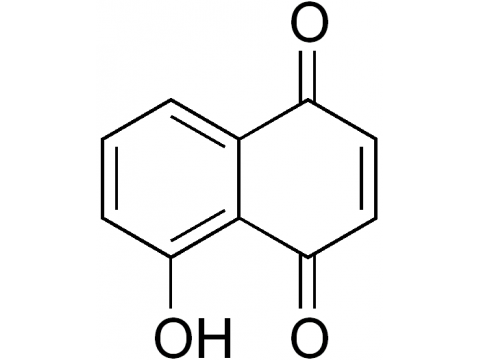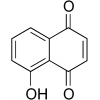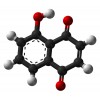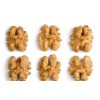Introduction
Project Name: Juglone
Alias Name: 5-hydroxy-1,4-naphthoquinone 5-hydroxy-1,4-naphthoquinone 1,4-Naphthalenedione, 5-hydroxy- 5-Hydroxy-1,4-naphthoquinone 5-Hydroxy-1, 4-naphthalenedione Juglone
Molecular Formula: C10H6O3
Molecular Weight: 174.16
Effect: Juglone mandshurica has hemostasis and antibacterial activity and has also been used to treat eczema, cowhide and hair tresses. As a pH indicator.
Pharmacological study of Juglone mandshurica
1. Anti-tumor effect
The jujube extracted from the walnut stalk has obvious anti-cancer activity for S180 solid tumor, mouse ascites type liver cancer and spontaneous gastric cancer. Juglone mandshurica has obvious anti-cancer activity against fractional-suppressed breast cancer, which makes mitosis of Ehrlich ascites cancer cells abnormal. Juglone mandshurica can directly inhibit the proliferation of tumor cells cultured in vitro, and its anti-tumor effect directly kills tumor cells. Experiments have shown that Juglone mandshurica has a significant inhibitory effect on the synthesis of tumor cell DNA, and it increases with the increase of dose. It was observed by electron microscopy that the walnut mites mainly affected the mitochondrial vacuolization of HePA cells. Therefore, the proliferating tumor cells are limited in proliferation due to lack of energy supply, thereby achieving tumor inhibition. Juglone also inhibits the S phase of cell growth, and the more the number of phenolic hydroxyl groups in the compound, the greater the cytotoxicity. In addition, it has been found that the walnut can block the potassium channel of human peripheral blood lymphocytes, and the potassium channel retention activity is considered as a prerequisite for cell growth and T cell proliferation, so it is considered that this effect of the walnut is not unique. It is also an important way for juveniles to induce apoptosis. In addition, the acacia can directly cleave the thiol group to break the complex before transcription initiation, inhibit the synthesis of cellular mRNA, and directly block transcription.
2. The effect on the enzyme
Jujube has an inducing effect on detoxification enzymes-quinone reductase and glutathione transferase in the cecal, duodenum, colon, glandular and jejunal tissues of mice, which enhances its activity and prevents chemical-induced intestinal cancer. Juglone is considered to be an inhibitor of peptidyl-prolyl isomerase, which is overexpressed in many tumor tissues and plays an important role in the development of tumors. The "catalytic molecule" of tumorigenesis, candied fruit can be called a promising drug for cancer prevention.
Juglone mandshurica and its derivatives have an inhibitory effect on HIV-1 reverse transcriptase (RT)-associated ribozyme H and can be a potent inhibitor of HIV-1 proteolytic enzyme, which is indispensable for HIV replication. One of the basic substances, the invention of this kind of agent can effectively prevent microorganisms, so it can be used to treat sexually transmitted diseases. In addition, Juglone mandshurica is a chitin synthase inhibitor that inhibits ecdysone 20-monozyme activity in insects such as female Egyptian mosquitoes and Drosophila melanogaster.
3. Antibacterial effect
Experiments have shown that Juglone mandshurica has inhibitory effects on many Gram-positive and Gram-negative bacteria. As an antibacterial agent, Juglone mandshurica can produce active oxidative anions. It can neutralize tetanus and diphtheria toxin in vitro, but it does not neutralize toxins in the body. Clinical trials have shown that the treatment of periodontitis with pecans has a significant effect. Walnut can also be added to cosmetics and toothpaste as a fungicide.
Juglone also regulates the production and development of aflatoxin, which inhibits the germination of fungi, and if the concentration is high enough, it can completely inhibit the growth of fungi.
4. Other effects
Juglone mandshurica has the effect of accelerating sugar assimilation and lowering blood sugar in rats. Walnut can be used as a raw material for dyes, pigments and fragrances, as a pH indicator and as a hemostatic agent for medicine. Walnut can be used to treat eczema, herpes, constipation, impotence, nocturnal emission, low back pain, lymphatic tuberculosis, and also for the treatment of diabetes, gastritis, anemia, etc. Walnut is used for the treatment of head lice, psoriasis and rubber edema, but pecan is a strong irritant that can cause contact dermatitis.
Walnut has a prominent role in forestry and agriculture. Walnut is the only naphthoquinone-based biomass that has been proven to be produced by higher plants. It can inhibit the growth of other plants and can be used to develop new pollution-free plant herbicides.
Use of Juglone
Walnut has a hemostatic and antibacterial activity and has also been used to treat eczema, cowhide and hair tresses. As a pH indicator.















